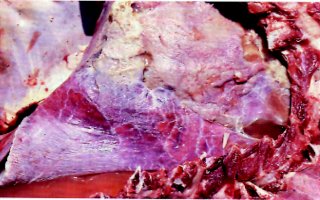

Severe, acute pneumonia in a calf with Pasteurella haemolytica infection. From http://proagri.co.za/
Can be caused by viruses, stress conditions or the bacteria. In South Africa the most common cause of pneumonia is Pasteurella haemolytica, this bacterium is found in the nasal passages of healthy animals but is prevented from reaching the lungs by the cilia (fine hairs) found in the air passages. If an animal is under stress and/or has a viral infection these cilia are hindered and the bacterium is able to reach the lungs. The bacterium then replicates and produces a toxic substance, leucotoxin, which damages the lung tissue. Mycoplasma spp, Pasteurella multocida and Haemophilus somnus can also cause pneumonia. Stress causes a rise in blood levels of glucocorticoids, these are substances which suppress the immune system of the cow and so infections are more prominant. Also damage to the respiratory tract caused by cuts disarms the animalís defense mechanisms. Therefore, bacteria that are present in the respiratory tract are allowed to grow and establish an infection then if the animal is stressed, it cannot overcome this infection.